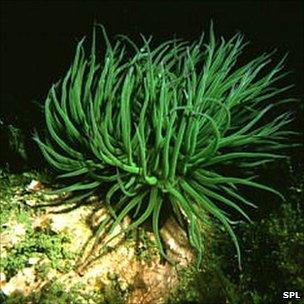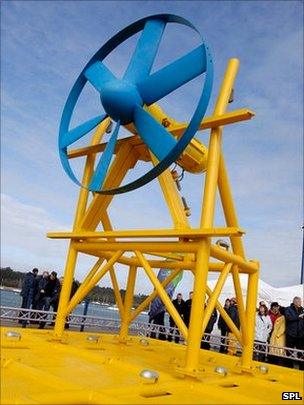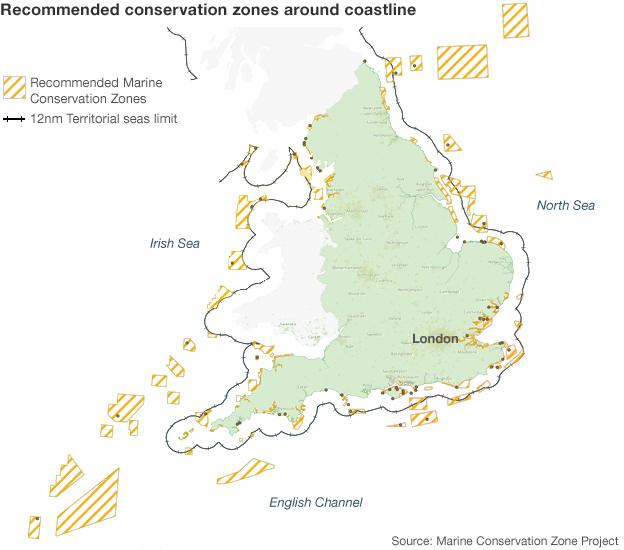Marine protection bids unveiled
- Published
- comments

The zones encompass protection for important plants and animals on the sea bed
Protection for key nature sites in UK seas has come a step closer with the unveiling of proposals to create over 100 Marine Conservation Zones (MCZs).
The zones range from tiny stretches of coastline to large tracts of sea floor.
The proposals stem from the 2009 UK Marine Bill and cover seas abutting the English coast and waters around Wales more than 12 miles from the coast.
They will be assessed by an expert panel before the government makes its final decision, probably next year.
The panel will also have to finalise levels of protection in each zone, as the Marine Bill allows regulators a lot of flexibility in what to prohibit (such as fishing) for which periods of the year.
If all proposals are approved, just over a quarter of English waters would end up under some kind of protection. Currently, the total is way under 1%.
But the zones are also supposed to be designed in such a way as to leave room for other activities such as industries and recreation.
"Today has seen our ambition to put in place special protection areas for marine life off the coast of England take a significant step forward," said Environment Minister Richard Benyon.
"The thousands of species of sealife and habitats that live hidden under our waters need just as much protection as those that we can see on land."
Scotland's Marine Bill passed only last year, so Scottish bids for protected areas are a little behind, but are expected to materialise next year. The Northern Ireland assembly has still to legislate.
'Coherent' aim
The ultimate aim is to create an "ecologically coherent" network of protected areas around all UK coasts, safeguarding important natural habitats while allowing other activities such as recreational angling, commercial fishing, surfing and marine energy to go ahead.

The zoning is designed to leave space for industries such as tidal electricity
Four different groups were formed to develop the portfolio of proposals in different parts of England and Wales.
They have brought together stakeholders that - at least in principle - cover all parties with an interest in the seas.
The group covering south-west England, for example, numbered representatives of the minerals industry, renewable electricity companies, charter boat skippers, scuba divers and the Ministry of Defence among a set of 41 stakeholders consulted.
The hope is that with a lot of the consultation already undertaken, the proposals should chart a relatively straightforward course through the approval process.
"We will scrutinise the recommendations carefully," vowed Peter Ryder, chairman of the Marine Protected Area Science Advisory Panel that will now assess the bids.
"And in October (we) will provide our scientific assessment on the extent to which the resulting composite network of MCZs and existing Marine Protected Areas is likely to achieve the goal of ecological coherence."
Among the sites proposed for protection are:
Chesil Beach, Dorset's remarkable stretch of shingle
Land's End
the Silver Pit, a relic of an ancient sub-glacial valley in the seabed off the Yorkshire coast
the Donna Nook seal colony in Lincolnshire
tracts covering thousands of square kilometres of seabed off the Cornish coast

The government and its advisors hope that in part, the protection measures will benefit industries such as tourism and fishing, by securing features that divers like to visit and by providing secure "nurseries" for juvenile fish.
"All MCZs should be fully protected from damaging activities and bottom-towed fishing gears, and our work has shown overwhelming public support for this stance," commented Melissa Moore, senior policy officer with the Marine Conservation Society (MCS).
"Fully protected sites have been shown to yield a fourfold increase in the weight of marine species, whilst species diversity increases by 20%."
While some proposed areas have already been struck off the list by industry concerns, she said, conservationists welcomed the proposals that "are desperately needed so that marine habitats and ecosystems can begin to recover from decades of degradation."
Follow Richard on Twitter, external
- Published14 June 2011